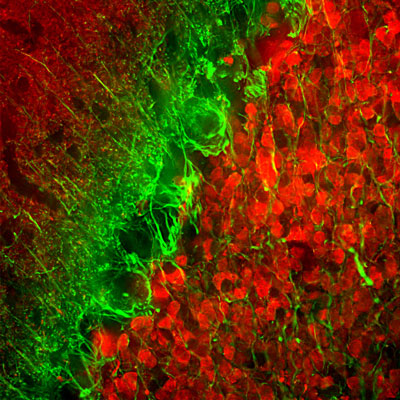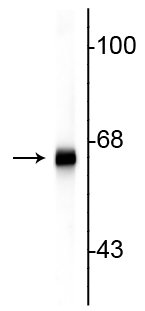Anti-Alpha Internexin/ NF-66 Antibody
Our Anti-Alpha Internexin/ NF-66 primary antibody from PhosphoSolutions is mouse monoclonal. It dete
- 产品详情
- 实验流程
- 背景知识
Application
| WB, IHC, ICC |
|---|---|
| Primary Accession | P23565 |
| Host | Mouse |
| Clonality | Monoclonal |
| Isotype | IgG1 |
| Clone Names | 1D2 |
| Calculated MW | 56115 Da |
| Other Names | 66 kDa neurofilament protein antibody, AINX_HUMAN antibody, Alpha Inx antibody, Alpha-internexin antibody, Alpha-Inx antibody, INA antibody, Internexin neuronal intermediate filament protein alpha antibody, MGC12702 antibody, NEF 5 antibody, NEF5 antibody, Neurofilament 5 (66kD) antibody, Neurofilament 5 antibody, Neurofilament 66 antibody, Neurofilament 66 tax binding protein antibody, Neurofilament-66 antibody, NF 66 antibody, NF-66 antibody, NF66 antibody, TXBP 1 antibody, TXBP1 antibody |
|---|---|
| Target/Specificity | Alpha-internexin is a Class IV intermediate filament originally discovered as it co-purifies with other neurofilament subunits (1). Alpha-internexin is related to but distinct from the better known neurofilament triplet proteins, NF-L, NF-M and NF-H, having similar protein sequence motifs and a similar intron organization. It is expressed only in neurons and in large amounts early in neuronal development, but is down-regulated in many neurons as development proceeds. Many classes of mature neurons contain alpha-internexin in addition to NF-L, NF-M and NF-H. In some mature neurons alphainternexin is the only neurofilament subunit expressed. Antibodies to alpha-internexin are therefore unique probes to study and classify neuronal types and follow their processes in sections and in tissue culture. In addition, recent studies show a marked up-regulation of alpha-internexin during neuronal regeneration (2). The use of antibodies to this protein in the study of brain tumors has not been examined to date, but is likely to be of interest. Recently Cairns et al. used this antibody to show that alphainternexin is an abundant component of the inclusions of neurofilament inclusion body disease (NFID), a serious human neurodegenerative disorder (3,4). The antibody was also used to confirm the presence of circulating auto-antibodies to alpha-internexin in the sera of some patients with endocrine autoimmunity, as well as in some normal individuals (5). |
| Dilution | WB~~1:1000 IHC~~1:100~500 ICC~~N/A |
| Format | Protein G purified |
| Storage | Maintain refrigerated at 2-8°C for up to 6 months. For long term storage store at -20°C in small aliquots to prevent freeze-thaw cycles. |
| Precautions | Anti-Alpha Internexin/ NF-66 Antibody is for research use only and not for use in diagnostic or therapeutic procedures. |
| Shipping | Blue Ice |
For Research Use Only. Not For Use In Diagnostic Procedures.
Provided below are standard protocols that you may find useful for product applications.
BACKGROUND
Alpha-internexin is a Class IV intermediate filament originally discovered as it co-purifies with other neurofilament subunits (1). Alpha-internexin is related to but distinct from the better known neurofilament triplet proteins, NF-L, NF-M and NF-H, having similar protein sequence motifs and a similar intron organization. It is expressed only in neurons and in large amounts early in neuronal development, but is down-regulated in many neurons as development proceeds. Many classes of mature neurons contain alpha-internexin in addition to NF-L, NF-M and NF-H. In some mature neurons alphainternexin is the only neurofilament subunit expressed. Antibodies to alpha-internexin are therefore unique probes to study and classify neuronal types and follow their processes in sections and in tissue culture. In addition, recent studies show a marked up-regulation of alpha-internexin during neuronal regeneration (2). The use of antibodies to this protein in the study of brain tumors has not been examined to date, but is likely to be of interest. Recently Cairns et al. used this antibody to show that alphainternexin is an abundant component of the inclusions of neurofilament inclusion body disease (NFID), a serious human neurodegenerative disorder (3,4). The antibody was also used to confirm the presence of circulating auto-antibodies to alpha-internexin in the sera of some patients with endocrine autoimmunity, as well as in some normal individuals (5).
终于等到您。ABCEPTA(百远生物)抗体产品。
点击下方“我要评价 ”按钮提交您的反馈信息,您的反馈和评价是我们最宝贵的财富之一,
我们将在1-3个工作日内处理您的反馈信息。
如有疑问,联系:0512-88856768 tech-china@abcepta.com.























 癌症的基本特征包括细胞增殖、血管生成、迁移、凋亡逃避机制和细胞永生等。找到癌症发生过程中这些通路的关键标记物和对应的抗体用于检测至关重要。
癌症的基本特征包括细胞增殖、血管生成、迁移、凋亡逃避机制和细胞永生等。找到癌症发生过程中这些通路的关键标记物和对应的抗体用于检测至关重要。 为您推荐一个泛素化位点预测神器——泛素化分析工具,可以为您的蛋白的泛素化位点作出预测和评分。
为您推荐一个泛素化位点预测神器——泛素化分析工具,可以为您的蛋白的泛素化位点作出预测和评分。 细胞自噬受体图形绘图工具为你的蛋白的细胞受体结合位点作出预测和评分,识别结合到自噬通路中的蛋白是非常重要的,便于让我们理解自噬在正常生理、病理过程中的作用,如发育、细胞分化、神经退化性疾病、压力条件下、感染和癌症。
细胞自噬受体图形绘图工具为你的蛋白的细胞受体结合位点作出预测和评分,识别结合到自噬通路中的蛋白是非常重要的,便于让我们理解自噬在正常生理、病理过程中的作用,如发育、细胞分化、神经退化性疾病、压力条件下、感染和癌症。








